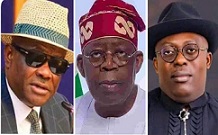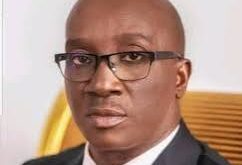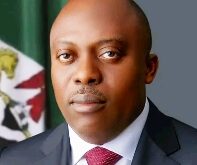By Ehichioya Ezomon
Former Lagos State Governor and Minister of Works and Housing, Babatunde Raji Fashola (SAN) – a protégé and staunch ally of President Bola Tinubu – kicked-off the debate about whether Tinubu should intervene in the political crises in Rivers and Ondo states.
Speaking at the Nigerian Air Force Officers Mess Honorary Members Forum 2023 Annual Lecture held in Lagos on December 16, Mr Fashola posed two rhetorical questions: “Does the Constitution assign a role to the president in this matter? Are those inviting the president to act in Ondo and in Rivers states not aware that the president has no constitutional role in these matters?”
On the crisis in Ondo between ailing Governor Olurotimi Akeredolu/State House of Assembly and Deputy Governor Lucky Aiyedatiwa, Fashola expressed happiness that “some blue-blood Ondo indigenes have stood up to be counted. But they are in an obvious minority,” and urged the “leadership in Rivers State to do the needful” by finding homegrown solution to the crisis, rather than passing responsibility to the president.”
Fashola also called on Nigerians to “amend themselves” and take accountability rather than improperly demanding presidential action, adding, “We have amended the Constitution, so what is left to amend except ourselves!”
Similarly, on December 19, Human Rights lawyer, Femi Falana (SAN), agreed with Fashola’s submission that President Tinubu hasn’t a constitutional role in resolving the political crises in Ondo and Rivers. “Therefore, the intervention of the president in both cases is purely advisory,” Falana said in a statement.
Noting that the presidential reinstatement of the 27 defected members of the Rivers Assembly “is alien to the Constitution in every material particular,” Mr Falana said, “the seats of the cross-carpeting members have been declared vacant by the (minority) Speaker (Edison Ehie) known to law.”
“Even if all the cases in the Rivers State High Court and the Federal High Court are withdrawn in line with the advice of the president, it is submitted that all actions taken by the Speaker (Edison Ehie) recognised by the Rivers State High Court remain valid, including his pronouncement on the vacant seats of the 27 cross-carpeting members of the House,” Falana said.
Falana advised the President and all parties involved in finding political solutions to the crisis in Rivers State to “turn to the Constitution for guidance without any further delay,” saying only a constitutionally-competent court “can set aside the pronouncement of the Speaker, which is anchored on Section 109 of the Constitution,” moreso as Speaker Ehie hasn’t been removed by the required number of legislators, and “a presidential directive cannot remove him.”
Also on December 19, Chief Robert Clarke (SAN) said there wasn’t any constitutional role for the president in the political fracas in Rivers, recalling that, “The only time, the only Constitution that allows the Federal Government to put its mouth in a local thing is during the First Republic when a declaration of emergency was declared in the West (former Western Region).
Clarke said: “The president has no power, he knows that. The best legal brain cannot help him. You can’t bring Robert Clarke to come and change the law, to enable the president to come and intervene. Under what constitutional provisions? So, the law by itself, as of today, did not provide (a right for Tinubu to intervene in State matters).
“The violation of rights in Rivers State can be rectified by the people of Rivers State themselves. Let the big men in Rivers State come out, call a rally, tell the people that we cannot continue to live when the properties of the state is being broken down by politicians,” referring to Governor Fubara’s order to demolish the Rivers House of Assembly.
Reactions by others to President Tinubu’s brokered peace in Rivers have mostly been vitriol, with some threatening and/or instigating sabotage of the Nigerian economy via attacks on oil and gas installations in the South-South geopolitical zone of the country.
The fight for supremacy over the political and governance affairs of Rivers had raged for months, with the potential to spread beyond the state to the entire South-South (Niger Delta) that lays the golden egg of Nigeria’s economy.
Leading the pack of opposition to Tinubu’s intervention in Rivers are senior lawyers, ethnic and tribal warlords, the PDP and social media critics who are pissed that, without a constitutional backing, the president had hammered out an agreement for a cease fire in the interest of the state and country, which’s undergoing severe economic strains.
However, no right-thinking president would stay aloof when a subnational entity that contributes majorly to the government revenue is about to explode, in order to avoid accusation of violating the Constitution or of interfering in matters on a different political platform from theirs.
Hence Tinubu invited the major stakeholders in the Rivers dispute, and at the end of the parley, an eight-point resolution was drawn up, read to the dramatis personae, who didn’t object to any of the items in the agreement, which they signed without compulsion.
The eight-point resolution includes: * Fubara to withdraw his court cases. * Rivers House of Assembly to withdraw its court cases, and the impeachment against Fubara. * Rt Hon. Martins Amaewhule remains the Speaker of the House. * The Assembly members to choose a place for their legislative meetings. * Fubara to represent the 2024 Budget to the House. * Fubara to allow fiscal autonomy of the House, and pay arrears to members and the Assembly workers. * The House to reapprove the commissioners, who resigned their appointments. * Fubara’s dissolution of Local Councils is null and void.
Given that Fubara lost all but one of the eight-point peace agreement – the withdrawal of moves to impeach him – there’s bedlam from supporters and sympathisers of the governor when a copy of the resolution was made public.
The criticism centred on Tinubu’s alleged violation of the amended 1999 Constitution; overstepping his bounds by interfering in matters in an opposition controlled state; recognising the Speaker and 26 pro-Wike lawmakers, without same accorded the court-endorsed four-member legislative chamber; the call to represent the already passed and signed 2024 budget; and recalling of commissioners, who voluntarily resigned their appointments.
The most fierce pushback is that Tinubu imposed the “so-called agreement” on Fubara, who reportedly refused to sign, but his signature allegedly superimposed on the published document. This piece of information was attributed to an anonymous aide to the governor.
A former Rivers Commissioner for Water Resources, Chief David Briggs, who’s at the peace meeting, said Tinubu ambushed and intimidated Fubara into signing the peace accord with Wike.
Briggs’ words: “I was there, so I’m a witness and what I say is primary, not secondary. We were invited for a meeting but that was not a meeting. What happened was that Mr. President walked in with a written resolution, addressed us and declared that ‘what he has in his hand is a presidential proclamation,’ and emphasises the fact that ‘he is the President of the Federal Republic of Nigeria, and anybody who dares to say no to what he is saying will face the consequences.'”
But Rivers State Information Commissioner, Mr Joseph Johnson, who also witnessed the peace accord, debunked those claims, and confirmed that Fubara’s signature on the publicly-disclosed resolution document on the Rivers crisis “was not forged,” and that, “the governor signed the peace pact willingly and without any pressure.”
Even as the governor’s supporters railed against President Tinubu, some discerning in their midst have asked Fubara to speak up, to deny or affirm signing the agreement. And perhaps to affirm Mr Johnson’s assertion – but without directly addressing the issue of the resolution – Fubara said on December 19 that there’s no price too big to pay to ensure peace in Rivers State.
It’s the first indication that the governor agreed to, and signed the controversial resolution, aimed at ending the political crisis in Rivers State, but which’s been rejected off-hand by Rivers stakeholders, led by former Governor Rufus Ada-George.
At the 3rd Convocation and 6th Founders Day ceremonies of the PAMO University of Medical Sciences in Iriebe Town, Obio-Akpor Local Government Area of Rivers State, Fibara said: “There is no price that will be too big to pay to ensure that peace prevails” in Rivers, adding that, “I’m prepared and will continue to pay the necessary price that will guarantee peace.”
The questions: Which would critics of Tinubu’s peace initiatives in Rivers crisis have preferred: That, as president overseeing affairs of the entire country without discrimination on grounds of political affiliation, Tinubu should intervene to find a “political solution” to the power tussle between Mr Fubara and Mr Wike?
Or the president should wait – amid the mayhem, drumbeats and series of court interventions – for the crisis to spiral out of order, and exercise his constitutional power, to declare a state of emergency in Rivers, and send Fubara and his government packing for a Sole Administrator, who’ll subordinate to the president, and the ruling APC?
Weren’t some of the critics among Nigerians, who’d called on Tinubu to intervene in Rivers (and Ondo), instead of sitting on the fence or fiddling while the state was about to burn – or already burning – to advance his political interest for a second term in office in 2027?
If the president had stayed out of the fray, won’t these emergency lovers of Fubara and Rivers State lampoon and even accuse him of stoking the embers to aid the Minister of the Federal Capital Territory (FCT), Mr Wike’s continued overlordship and control of Rivers politics and governance affairs?
Have these lawyers, ethnic and tribal warlords, the PDP and social media critics forgotten that Nigerian judges – who are abreast with the provisions of the 1999 Constitution – have consistently admonished that litigants – no matter the issues at stake – should explore out-of-court settlements rather than rushing to court for judicial intervention?
Still, the real question: What section(s) of the amended 1999 Constitution of Nigeria did President Tinubu breach in his attempt to halt a volatile situation from festering, and spreading beyond Rivers, and posing grave danger to the political and economic health of the nation?
Some Nigerians, tweeting on X (formerly Twitter) wonder why lawyers are busy, quoting the Constitution, when the house is burning, querying, “do they want Rivers and Ondo to be burn down completely,” and they’re now disappointed by President Tinubu’s intervention?”
A tweep, Deepee, @deepeegbemi, wrote: “The president has to take permission from some ‘Hanty onile okan’ before mediating in his country’s affairs, as he didn’t study the law she (reference to a lawyer who censored Tinubu’s peace deal) studied specially in school. Her kind of law precludes the president from mediating in sub-national affairs.”
Olubunmi Aro @olubunmiaro, wrote: “They (lawyers) kept quiet when the (Rivers) govt demolished the state house of assembly, he (Fubara) presented budget to 4 people and signed under 24 hours. Now they are supporting Sim (Fubara) bcos Wike is involved. This is hypocrisy of its highest order. Do they want war in Rivers state before the president intervene? If the president kept mute, another horrible event would have happened by now.”
#Renewed Hope @BayoAdedosu, wrote: “They want a do-nothing president so that they can later say that the president caused the crisis since Wike is PBAT’s minister. They’re always foaming in the mouth like kids with epilepsy.”
Meantime, it makes interesting reading the threat by elder statesman, Chief Edwin Kiagbodo Clark, to sue the president over his intervention in the Rivers crisis, advising Fubara “to disown the purported agreement,” even as he reduces the matter to alleged Tinubu’s hatred for the Ijaw people.
Clark, former Federal Minister of Information in the First Republic, and leader of the Pan Niger Delta Forum (PANDEF), argues that Tinubu, as the President and Commander-in-Chief of the Armed Forces of Nigeria, hasn’t the constitutional right to intervene in Rivers affairs that’ve the potential to affect the peace, socio-political and economic prospects of Rivers, and the country.
Save the withdrawal of impeachment against Fubara by the 27 APC members of Rivers Assembly, Clark queries on whose authority Tinubu forced the other seven items of the resolution on Fubara.
Clark said: “The directives of Mr. President are absurd and cannot hold water. Mr. President should be aware that Siminialayi Fubara, today, is the elected Governor of Rivers State in the same manner Bola Tinubu is the elected President of the country. And as a governor, Mr. Fubara possesses all the powers as conferred on him by the Constitution.
“By the actions of President Tinubu, he has really shown his dislike and disdain for the Ijaw people, and confirms his hatred for them. And as the leader of the Ijaws, we will resist it.
“We will advise Governor Fubara to disown the purported agreement. He should speak out to Nigerians, that he did not sign that agreement. He is not owing anybody any obligation.”
What Clark and others, who parade as defenders of the Constitution, and emergency lovers of Mr Fubara wanted was for him to show and demonstrate that he wasn’t beholden to his political benefactor, Mr Wike, in the fight for supremacy over control of Rivers polity.
And Fubara, attempting to fend-off Wike from overrawing him, and undermining his powers as Governor, fell for the instigators’ gimmick to embark on illegal activities, such as demolition of the Rivers House of Assembly, resulting from the partial torching of the complex by political thugs protesting the impeachment threats against Fubara by pro-Wike members of the assembly.
Others include: Fubara recognised a four-member chamber from a 32-member House of Assembly, and gave it sanctuary in the Executive Chamber at the Government House; and encouraged them to obtain a court injunction to legitimise themselves, declare vacant the seats of the 27 APC members, and pass an N800bn budget under 24 hours, which Fubara signed into law immediately.
So far, the 27 APC lawmakers, sitting separately from their four PDP counterparts on December 20, withdrew the impeachment moves against Fubara in the eight-point resolution. This could give a wider berth to the anti-Tinubu peace critics to pressure the governor to ditch the deal, signaling that the coming weeks and months remain a testing period for Fubara and Wike, and ominous for Rivers polity!
*Mr Ezomon, journalist and media consultant, writes from Lagos, Nigeria.
 PH Mundial – Port Harcourt Online Newspaper News Across The Region
PH Mundial – Port Harcourt Online Newspaper News Across The Region





